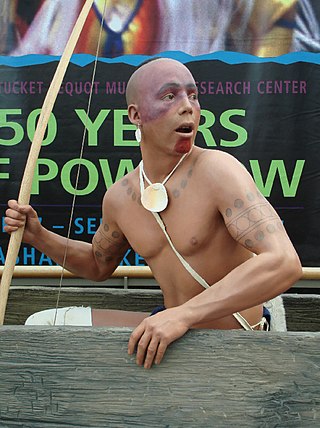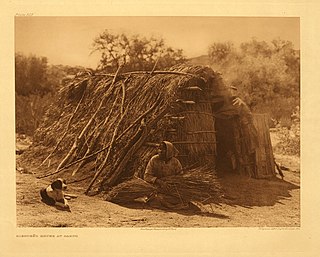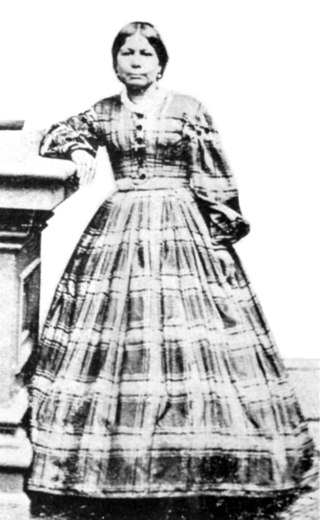
Native American gaming comprises casinos, bingo halls, and other gambling operations on Indian reservations or other tribal lands in the United States. Because these areas have tribal sovereignty, states have limited ability to forbid gambling there, as codified by the Indian Gaming Regulatory Act of 1988. As of 2011, there were 460 gambling operations run by 240 tribes, with a total annual revenue of $27 billion.

The Pequot are a Native American people of Connecticut. The modern Pequot are members of the federally recognized Mashantucket Pequot Tribe, four other state-recognized groups in Connecticut including the Eastern Pequot Tribal Nation, or the Brothertown Indians of Wisconsin. They historically spoke Pequot, a dialect of the Mohegan-Pequot language, which became extinct by the early 20th century. Some tribal members are undertaking revival efforts.

The Narragansett people are an Algonquian American Indian tribe from Rhode Island. Today, Narragansett people are enrolled in the federally recognized Narragansett Indian Tribe. They gained federal recognition in 1983.
The Golden Hill Paugussett is a state-recognized Native American tribe in Connecticut. Granted reservations in a number of towns in the 17th century, their land base was whittled away until they were forced to reacquire a small amount of territory in the 19th century. Today they retain a state-recognized reservation in the town of Trumbull, and have an additional reservation acquired in 1978 and 1980 in Colchester, Connecticut.

The Indian Health Service (IHS) is an operating division (OPDIV) within the U.S. Department of Health and Human Services (HHS). IHS is responsible for providing direct medical and public health services to members of federally recognized Native American Tribes and Alaska Native people. IHS is the principal federal health care provider and health advocate for Indian people.

The Schaghticoke are a Native American tribe of the Eastern Woodlands who historically consisted of Mahican, Potatuck, Weantinock, Tunxis, Podunk, and their descendants, peoples indigenous to what is now New York, Connecticut, and Massachusetts. The remnant tribes amalgamated in the area near the Connecticut-New York border after many losses, including the sale of some Schaghticoke and members of neighboring tribes into slavery in the Caribbean in the 1600s.

Mohegan Sun is an American casino, owned and operated by the Mohegan Tribe on 240 acres (97 ha) of their reservation, along the banks of the Thames River in Uncasville, Connecticut. It has 364,000 square feet of gambling space.

The Eastern Pequot Tribal Nation is an American Indian tribe in southeastern Connecticut descended from the Pequot people who dominated southeastern New England in the seventeenth century. It is one of five tribes recognized by the state of Connecticut.

Fidelia Ann Hoscott Fielding, also known as Dji'ts Bud dnaca, daughter of Bartholomew Valentine Smith and Sarah A. Wyyougs (1804–1868), and granddaughter of Martha Shantup Uncas (1761–1859), was the last-known speaker of the traditional Mohegan Pequot language.

The Campo Indian Reservation is home to the Campo Band of Diegueño Mission Indians, also known as the Campo Kumeyaay Nation, a federally recognized tribe of Kumeyaay people in the southern Laguna Mountains, in eastern San Diego County, California. The reservation was founded in 1893 and is 16,512 acres (66.82 km2).
The Mohegan are an Algonquian Native American tribe historically based in present-day Connecticut. Today the majority of the people are associated with the Mohegan Indian Tribe, a federally recognized tribe living on a reservation in the eastern upper Thames River valley of south-central Connecticut. It is one of two federally recognized tribes in the state, the other being the Mashantucket Pequot, whose reservation is in Ledyard, Connecticut. There are also three state-recognized tribes: the Schaghticoke, Paugusett, and Eastern Pequot.

Ralph Weston Sturges was an American Mohegan tribal chief who helped gain federal recognition for the Mohegan people of Connecticut in 1994. He also helped to found and build Connecticut's Mohegan Sun Casino. He held the title of "chief for life."

Gladys Iola Tantaquidgeon was a Mohegan medicine woman, anthropologist, author, tribal council member, and elder based in Connecticut.
Malerba is a surname. Notable people with the surname include:

Mohegan Indians v. Connecticut (1705–1773) was the first indigenous land rights litigation in history in a common law jurisdiction. James Youngblood Henderson, professor of law, calls the case "the first major legal test of indigenous tenure." Robert Clinton calls it the "first formal litigation of North American Indian rights."

The Mohegan Tribe is a federally recognized tribe and sovereign tribal nation of the Mohegan people. Their reservation is the Mohegan Indian Reservation, located on the Thames River in Uncasville, Connecticut.
Melissa Tantaquidgeon Zobel is a Mohegan author, historian, and storyteller who serves as both the Medicine Woman and Tribal Historian for the Mohegan Tribe. In addition, she is executive director of the tribe's cultural and community programs department. Also a prolific writer, Zobel has published many books including the historical biography, Medicine Trail: The Life and Lessons of Gladys Tantaquidgeon, and the futuristic novel Oracles. Some publications appear under her maiden name of Melissa Jayne Fawcett.
The Wangunk or Wongunk were an Indigenous people from central Connecticut. They had three major settlements in the areas of the present-day towns of Portland, Middletown, and Wethersfield. They also used lands in other parts of what were later organized by English settlers as Middlesex and Hartford counties. Some sources call the Wangunk the Mattabessett, or Mattabesch, but Wangunk is the name used by scholars and by contemporary Wangunk descendants.

Emma Tyler Fielding Baker Dec. 5, 1828 - Jan. 20, 1916) was a member of the Mohegan Pequot Indian tribe and was posthumously awarded the title of Mohegan medicine woman in 1992. Medicine women were culture-bearers and required to have an in-depth knowledge of tribal customs and possess good leadership qualities. She was also a tribal historian and ceremonial leader of the Mohegan Tribe.















